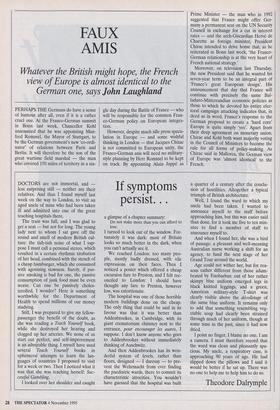If symptoms persist.. .
DOCTORS are not immortal, and less surprising still — neither are their relatives. And thus I found myself last week on the way to London, to visit an aged uncle of mine who had been taken ill and admitted into one of the great teaching hospitals there.
The train was full, and I was glad to get a seat — but not for long. The young lady next to whom I sat gave off the sound and smell of modern British cul- ture: the tish-tish noise of what I sup- pose I must call a personal stereo, which resulted in a certain rhythmic titubation of her head, combined with the stench of a cheap hamburger, which she consumed with agonising slowness. Surely, if pas- sive smoking is bad for one, the passive consumption of junk food must be even worse. Can one be passively choles- terolled, I wonder? Here is something worthwhile for the Department of Health to spend millions of our money studying.
Still, I was prepared to give my fellow- passenger the benefit of the doubt, as she was reading a Teach Yourself book, while she destroyed her hearing and clogged up her arteries. We none of us start out perfect, and self-improvement is an admirable thing. I myself have used several 'Teach Yourself books in ephemeral attempts to learn the lan- guages of countries I proposed to visit for a week or two. Then I noticed what it was that she was teaching herself: Suc- cessful Gambling.
I looked over her shoulder and caught a glimpse of a chapter summary:
Do not stake more than you can afford to lose.
I turned to look out of the window. For- tunately it was dark: most of Britain looks so much better in the dark, when you can't actually see it.
We reached London: too many peo- ple, mostly badly dressed, with vile expressions on their faces. Then I noticed a poster which offered a cheap excursion fare to Preston, and I felt rec- onciled to London: I should have thought any fare to Preston, however low, was extortionate.
The hospital was one of those horrible modern buildings done on the cheap. The only thing that could be said in its favour was that it was better than Addenbrookes, in Cambridge, with its giant crematorium chimney next to the entrance, pour encourager les autres, I suppose. I don't know anyone who goes to Addenbrookes without immediately thinking of Auschwitz.
And then Addenbrookes has its won- derful system of levels, rather than floors, designed — I daresay — to pre- vent the Wehrmacht from ever finding the paediatric wards, there to commit its characteristic atrocities. You wouldn't have guessed that the hospital was built a quarter of a century after the conclu- sion of hostilities. Altogether a typical triumph of British architecture.
Well, I found the ward to which my uncle had been taken. I wanted to announce myself to the staff before approaching him, but this was easier said than done, for it took me five to ten min- utes to find a member of staff to announce myself to.
And when I found her, she was a bird of passage: a pleasant and well-meaning Australian nurse working a shift for an agency, to fund the next stage of her Grand Tour around the world.
Age could not wither her, but for rea- sons rather different from those adum- brated by Enobarbus: out of her rather skimpy blue uniform emerged legs in black knitted leggings, and a green, American military-style T-shirt was clearly visible above the décolletage of the same blue uniform. It remains only to add that something resembling veg- etable soup had clearly been strained through much of her uniform, though at some time in the past, since it had now dried.
I point no finger, I blame no one. I am a camera. I must therefore record that the ward was clean and pleasantly spa- cious. My uncle, a respiratory case, is approaching 90 years of age. He had slipped down the pillows and I said it would be better if he sat up. There was no one to help me to help him to do so.
Theodore Dalrymple










































































 Previous page
Previous page